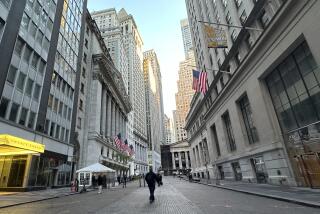Signs of Strength Spark Yield Surge
- Share via
Bond yields soared across the board Friday in the wake of fresh economic data questioning the extent of the economy’s slowdown and raising new fears about inflation.
Stock prices were broadly lower, but the losses were modest and trading volume was light.
The markets’ action added more drama to the backdrop of the Federal Reserve’s meeting Tuesday.
In the bond market, the yield on the 10-year Treasury note--a key benchmark for home mortgage rates--rocketed from 5.29% on Thursday to 5.45%, the highest since December.
The one-year Treasury bill, which is closely tied to interest rate moves by the Fed, jumped to 3.81% from 3.69% on Thursday. (Yields move in the opposite direction of a bond’s price.)
The Dow Jones industrial average fell 89.13 points, or 0.8%, to 10,821.31. The Nasdaq composite eased 21.43 points, or 1%, to 2,107.43.
Losers topped winners by 21 to 17 on Nasdaq and by 17 to 13 on the New York Stock Exchange, which had its slowest trading day of the year.
In the wake of Friday’s reports on retail sales, consumer confidence and wholesale inflation, bond investors appear to be betting that the economy is now sure to avoid recession, analysts say.
That raises questions about what Fed policymakers will do at their meeting Tuesday: Can the Fed now cut its key short-term interest rate by the half-point many analysts were expecting? Or will the Fed opt for a smaller cut--or no cut at all?
“Earlier in the week, almost everyone thought the Fed would cut rates one-half point,” said Sung Won Sohn, chief economist with Wells Fargo & Co. “But with this new data [Friday], the bond market is worried the Fed won’t cut rates that much.”
Some bond investors also fear that the Fed has already done enough to stoke the economy, and risks fueling inflation later in the year if it eases credit further.
The Fed has cut short-term interest rates a total of two percentage points this year in four moves.
Meanwhile, stock investors also appear to be betting on an economic recovery--which is why share prices didn’t plunge Friday even as bond yields surged. Equity investors hope a stronger economy will boost corporate profits.
Some analysts said investors may have pushed Treasury bond yields too low in recent months.
“Maybe there was a little too much exuberance built up in the bond market,” said Dave Ballantine, head of trading for Payden & Rygel, a Los Angeles bond firm. “If the consumer is alive and spending, as the retail data showed, then maybe the bond market was just too aggressive in expecting a recession.”
Treasury bond prices were also hampered Friday by a flood of new supply, with billions of dollars of new government debt and about $26 billion of corporate debt--including the largest bond sale by a U.S. firm, nearly $12 billion from telecom giant WorldCom Inc.
“People who took cover in a safe harbor like Treasuries earlier this year are going back into corporate debt and tax-exempts,” Sohn said. “Earlier this year, the bond market asserted that we were going into a recession. Now it’s backtracking.”
On Wall Street, retailers rose on the strong April retail sales report. Wal-Mart Stores rose 68 cents to $54.10, and home-improvement retailer Home Depot added 63 cents to $49.88. Both helped stem the Dow’s slide.
But weighing on the Dow were J.P. Morgan Chase, which fell $1.07 to $46.44, and “old-economy” companies including aluminum firm Alcoa, off $1.64 to $40.27.
IBM, another Dow component, fell $3.39 to $111.81 after its stock was downgraded. Among other tech shares, Intel fell $1.07 to $27.94, Oracle lost 49 cents to $15.90 and AOL Time Warner lost 81 cents to $51.64.
Despite the jittery markets, economists predicted the Fed would make a rate cut Tuesday. But if the cut is just one-quarter of a percentage point--reducing the central bank’s key rate to 4.25%--it will cast doubt on any additional cut in June, many analysts said.
Some traders said it was part of the Fed’s strategy to keep the market guessing. Some also worry that the hope of more rate cuts is keeping the market artificially inflated.
“The Fed keeps charging to the rescue to avoid a bear market” for stocks, said Michael Balog, director of equity marketing for Banc of America Securities in San Francisco. “I think we need to go back to a normal market. We’ve been in a Disneyland market, artificially created by the Fed. It’s important that the market return to fundamentals.”
(BEGIN TEXT OF INFOBOX / INFOGRAPHIC)
Betting on a Recovery
Bond yields have surged in recent weeks, while the stock market has held in a narrow range after soaring in April. Both markets are predicting a stronger economy ahead, analysts say.
Source: Bloomberg News
More to Read
Inside the business of entertainment
The Wide Shot brings you news, analysis and insights on everything from streaming wars to production — and what it all means for the future.
You may occasionally receive promotional content from the Los Angeles Times.










